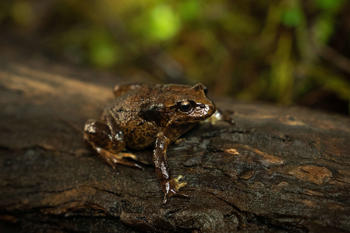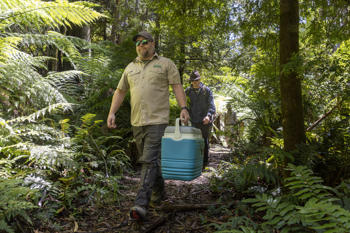Baw Baw Frog
All estimates point to extinction in the wild for the Baw Baw Frog in just five to 10 years.
The Baw Baw Frog is a small brown amphibian only found in the high-altitude forests of Baw Baw Plateau, where they spend most of their time buried under leaf litter and soil. When male frogs reach sexual maturity at approximately four-years-old, they establish call sites during spring and sing to attract females.
When tadpoles emerge, they are creamy white and will increase pigmentation during their development. Tadpoles are born with a large yolk sac, which they rely on for nourishment until metamorphosis when they will begin to emerge and feed for themselves.
Major threats
The wild Baw Baw Frog population has declined by more than 98% since the late 1980s. This loss is mainly attributed to the disease Chytridiomycosis, which is caused by Amphibian Chytrid Fungus infection. Impacts from climate change, habitat destruction and pressures from introduced species also contribute to the decline.

The plan for fighting extinction
Melbourne Zoo’s amphibian specialists worked closely with survey teams to collect egg masses and adult frogs to establish a conservation insurance population in 2011.
In 2018, the Zoo’s amphibian specialists were the first in the world to successfully breed the Baw Baw Frog and now contribute to a conservation breeding program, which supplements wild populations with genetically robust eggs, froglets and adults.
Zoos Victoria’s Wildlife Detection Dog team began assisting field surveys in 2022 in the hopes of helping researchers to detect both male and female frogs, and extend the survey periods beyond when males are call.
Zoos Victoria is also researching the role of chytrid fungus in the decline of frog numbers.

Our Partners
- Baw Baw Frog Recovery Team
- Baw Baw Shire Council
- Department of Environment, Energy and Climate Action
- Mt Baw Baw Alpine Resort
- University of Wollongong
How you can help
- Most Australians don’t know about the Baw Baw Frog. Do what you can to create community awareness and support.
- By visiting our zoos, you will be supporting our work to fight extinction.
- Donate if you can. As we are a not-for-profit organisation, all donations go towards our important conservation efforts.
- Discover more about local conservation events and join the growing number of Wild Activists taking action for local wildlife.
Is your classroom learning about the Baw Baw Frog ?
Browse through our collection of animal teaching and learning resources for students. These include animal toolkits, e-books, Ask a Zoo Expert resources, video showcases and real-world examples to support the VCE Study Design.
